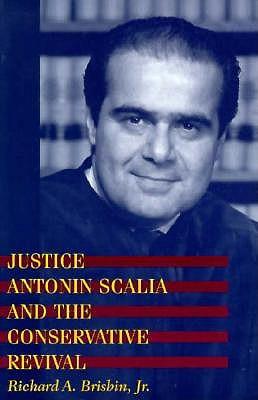
Zustellung: Sa, 02.08. - Fr, 08.08.
Versand in 3-4 Wochen
VersandkostenfreiAs the leading legal voice of the American conservative movement, Supreme Court Justice Antonin Scalia has challenged the assumptions and legal methodology of American liberals. In this thorough and exacting study of the development of Justice Scalia's legal principles, political scientist Richard Brisbin explores the foundation and elaboration of the justice's conservative political vision. Scalia's jurisprudence, Brisbin contends, values order and stability over pragmatism and experiment, relying on a majoritarian view rather than on any nucleus of founding principles embedded in the American constitution. After reviewing Scalia's legal experiences before joining the Supreme Court and describing the influences on his political and legal thought, Brisbin undertakes a detailed analysis of Scalia's Supreme Court voting record and opinions. The conservative philosophy emerging from Scalia's legal decisions, Brisbin argues, assumes the legitimacy and propriety of political regimes functioning under the rule of law. It disciplines - sometimes harshly - inappropriate uses of liberty and accepts the proposition that the law can serve as an effective means to structure, interpret, and control political conflicts. Brisbin concludes that the language of Scalia's legal opinions reinforces a politics of inequality.
Produktdetails
Erscheinungsdatum
25. September 1998
Sprache
englisch
Auflage
Revised edition
Seitenanzahl
488
Autor/Autorin
Richard A Brisbin
Verlag/Hersteller
Produktart
kartoniert
Gewicht
708 g
Größe (L/B/H)
228/152/30 mm
ISBN
9780801860942
Entdecken Sie mehr
Pressestimmen
Brisbin's book on Scalia draws upon all of these traditions and more, aspiring to be a comprehensive, almost biographical effort to explain the elements influencing the Justice's decision-making and the make-up of his political vision. Rich in voting data and inclusive in discussing Scalia's most important Court of Appeals and Supreme Court decisions, the book offers many fine arguments and observations. -- David Schultz Law and Politics Book Review Richard Brisbin shows us another reason why Justice Scalia is unpopular in certain precincts: In a time of value-relativism and militant identity politics, he is the leading exponent of Enlightenment beliefs. Justice Scalia's jurisprudence, Mr. Brisbin shows, seeks to protect our property from bureaucrats, to require that people be treated as individuals rather than as representatives of a class or race, and to use the rule of law as a restraint against disorder and conflict. As an advocate of postmodernism and a proud egalitarian, Mr. Brisbin appears to deplore these results, but he has the fairness to acknowledge that Justice Scalia is a tenacious exponent of the politics of reason that the Framers bequeathed to us through a written constitution. -- John O. McGinnis Wall Street Journal Brisbin argues that Justice Scalia's jurisprudence values order and stability over pragmatism and experiment, relying on a majoritarian view rather than on any nucleus of founding principles embedded in the Constitution... He concludes that the language of Scalia's legal opinions reinforces a politics of inequality by excluding the effect of social and economic factors on equality under the law. Law and Social Inquiry
Bewertungen
0 Bewertungen
Es wurden noch keine Bewertungen abgegeben. Schreiben Sie die erste Bewertung zu "Justice Antonin Scalia and the Conservative Revival" und helfen Sie damit anderen bei der Kaufentscheidung.







